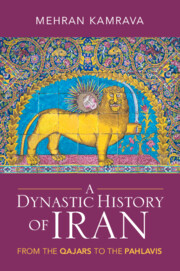Book contents
- A Dynastic History of Iran
- A Dynastic History of Iran
- Copyright page
- Contents
- Figures
- Tables
- Preface
- Acknowledgments
- 1 Introduction
- 2 Qajar Autocracy
- 3 The Constitutional Revolution
- 4 The New Dynasty
- 5 Iran and Great Game Politics
- 6 Dynasty Consolidated
- 7 Economic Development, Political Underdevelopment
- 8 The Gendarme of the Region
- 9 The Monarchy’s End
- 10 Conclusion
- Bibliography
- Index
7 - Economic Development, Political Underdevelopment
Published online by Cambridge University Press: 18 August 2022
- A Dynastic History of Iran
- A Dynastic History of Iran
- Copyright page
- Contents
- Figures
- Tables
- Preface
- Acknowledgments
- 1 Introduction
- 2 Qajar Autocracy
- 3 The Constitutional Revolution
- 4 The New Dynasty
- 5 Iran and Great Game Politics
- 6 Dynasty Consolidated
- 7 Economic Development, Political Underdevelopment
- 8 The Gendarme of the Region
- 9 The Monarchy’s End
- 10 Conclusion
- Bibliography
- Index
Summary
The state that evolved under the second Pahlavi monarch featured rapid economic development and persistent political underdevelopment. Especially from the 1950s onward, when the amount of oil revenues coming into the economy increased significantly compared with before, the economy began showing classic signs of the “resource curse.” As is often the case, resource curse – that is, the negative consequences of overabundance of a single commodity and the riches accrued from it to the economy – had manifold ramifications for Iran. As the economy grew, reliance on its single, biggest source of growth, oil, deepened greatly. This occurred at the expense of other sectors of the economy, especially agriculture. It also hastened rural flight, resulted in unplanned urban growth, and brought about maladjustments between economic needs on the one hand and resources, skills, and opportunities on the other. More detrimentally, it froze or significantly slowed down any transition out of rentier arrangements and strengthened existing institutions and practices where they were. The state may have fostered economic development, but it remained politically underdeveloped itself.
Keywords
- Type
- Chapter
- Information
- A Dynastic History of IranFrom the Qajars to the Pahlavis, pp. 125 - 152Publisher: Cambridge University PressPrint publication year: 2022

